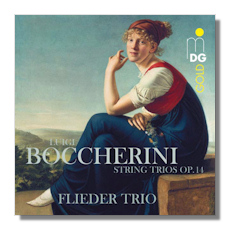
The Internet's Premier Classical Music Source
Related Links
- Boccherini Reviews
- Latest Reviews
- More Reviews
-
By Composer
-
Collections
DVD & Blu-ray
Books
Concert Reviews
Articles/Interviews
Software
Audio
Search Amazon
Recommended Links
Site News
 CD Review
CD Review
Luigi Boccherini

String Trios, Op. 14 #1-6
- Trio for Violin, Viola & Cello in F Major, G. 95
- Trio for Violin, Viola & Cello in C minor, G. 96
- Trio for Violin, Viola & Cello in A Major, G. 97
- Trio for Violin, Viola & Cello in D Major, G. 98
- Trio for Violin, Viola & Cello in E Flat Major, G. 99
- Trio for Violin, Viola & Cello in F Major, G. 100
Flieder Trio
Dabringhaus & Grimm MDG3080378-2 77min
Born in 1743 as the son of a double bass player, Luigi was a celebrated cellist at an early age. When he was 14 his solo performances of sonatas and concerti brought him great success in Northern Italy, but concert life in mid-18th century Italy was not ideal to support a young virtuoso, so Boccherini had to resort to playing in orchestras to carve out a living. Constrained to go to Vienna to play in the Karnetor Theatre Orchestra, and back to his native Lucca to perform in the Capella Palatina, the young musician soon decided that this was not what he desired. To free himself from these orchestral obligations, he travelled to Paris in 1768 to embark on a career as an independent artist. It was in the French capital that he published his first compositions with considerable success. In 1770 he eagerly accepted an invitation to enter into the service of the Spanish "infante", Don Luis de Bourbon with the hope of consolidating his position, but this turned out to be the gravest mistake of his life. He remained in Spain for 35 years until his death in 1805, but this period was one of artistic slavery compounded by isolation and neglect from the larger musical world. He died in poverty and grief, forgotten even by those in whose service he was.
Incredibly, in the face of all this adversity, Boccherini was producing one masterpiece after another. By the year of his demise his catalogue included 90 string quartets, 125 string quintets, 30 symphonies and 50 string trios, works which were repeatedly issued in new printings in Paris, London and Amsterdam. Indeed the music critic Charles Burney commented that Boccherini had composed more outstanding pieces than any other master of his time – Haydn apart; and today we can accept that his style, which Burney characterized as bold, masterful and elegant, was marked by the expressivity of early classicism.
Boccherini composed his Trios, Op. 14 in 1772, when he was just starting his Spanish stint. These were happy years and the music reflects all the joy and bliss of a new-found freedom. Each trio brims with fresh and innovative ideas, and every movement is rich in tonal coloration and a judicious sense of ensemble writing. These works, with their simple yet captivating lyricism are, above all, a supreme attestation to Boccherini's much praised cello playing.
These recordings by the Flieder Trio were taped way back in 1990 but the passing of more than two decades has not dimmed the refreshingly spontaneous playing that is coming "straight from the heart", and the spirited and consistently brilliant interpretations are still as alluring as ever before. A generously filled well annotated disc that should fill one of the many gaps in the Boccherini discography. Recommended, even to die-hard periodists.
Copyright © 2012 by Gerald Fenech.





















